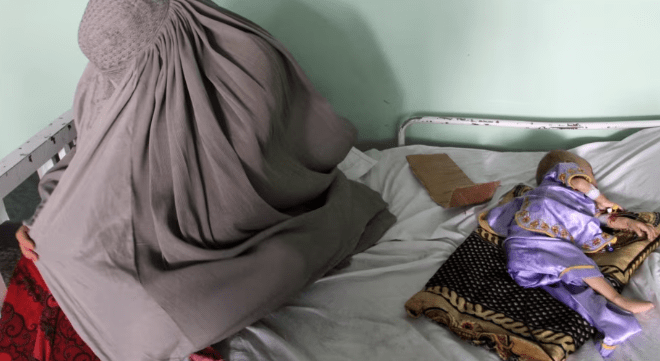
A new report by the World Health Organization (WHO) says respiratory diseases have killed more than 2,000 children under the age of 5 this year in Afghanistan, a problem that may grow due to the country’s underfunded health-care system.
The December 11 report said that from the beginning of this year to earlier this month, the suspected cases of respiratory diseases in the mountainous country exceeded 1.2 million, higher than the average number of cases reported during the three preceding years.
The infections have killed 2,513 people in total, of which more than 80 percent were children under the age of 5.
WHO said the increase was likely linked to cold weather and the organization’s ability to better observe the spread of diseases in Afghanistan.
Since the Taliban returned to power in 2021, health care across Afghanistan has deteriorated because of a lack of funding and the exodus of qualified professionals. Almost all health-care services the previous pro-Western Afghan Republic offered were funded by international donors.
In August, the WHO warned of “dire consequences” if health care remains underfunded in Afghanistan.
“The health sector is facing significant barriers to delivering holistic services to the Afghan people, especially women and children, resulting in fragmentation and increased vulnerability, particularly in underserved areas,” an alert by the group said.
For impoverished Afghans, respiratory infections and allergies are major worries during the long winters when temperatures frequently dip below freezing.
“We get sick more often when the air becomes dry and cold,” said Abdul Moeed Hashemi, a resident of the capital Kabul.
He says that the dusty and polluted air in the city of 5 million residents is a major hazard.
“My 10-year-old son has been allergic to dust all his life,” he added.
In the western city of Herat, Anita Kakar has asthma, which she says worsens with the cold weather.
“During the winter months [November through March], our health condition is not good,” she told RFE/RL’s Radio Azadi.
Elias Ghafurzai, a physician in Kabul, says improved healthcare and diet and greater awareness about how to prevent respiratory diseases from spreading can avoid the high incidence of respiratory infections.
“Wearing a mask and staying away from people with acute respiratory diseases are among the most basic steps to prevent such diseases,” he told Radio Azadi.
“Once infected, going to the doctor quickly, keeping warm, and good nutrition can help,” he added.






